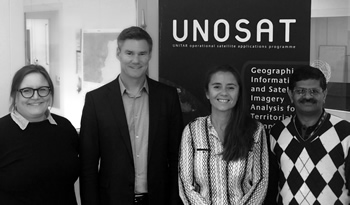NORCAP and UNOSAT Partner for Disaster Risk Reduction, Climate Services and Strategic Management
6 June 2017, Geneva, Switzerland - UNOSAT benefits from working with several organizations seconding expert personnel. Such collaborations include partners as varied as the Swiss Humanitarian Aid Unit, the Algerian Space Agency, and the Norwegian Refugee Council. Through the deployment of expertise meeting competency needs, these partnerships are an invaluable source of improvement for UNOSAT. This is particularly the case with regard to our collaboration with NORCAP, the Norwegian Refugee Council’s expert deployment capacity.
 NORCAP deploys experts to the United Nations and international, regional and national partners, to improve “their ability to prevent, prepare for, respond to and recover from crises.” The prequalified roster members are experienced humanitarian and development professionals, who in total have been deployed to more than 9,000 missions since the establishment of NORCAP in 1991. In 2016 NORCAP sent almost 400 experts on 500 missions to improve protection, coordination, peacebuilding and resilience efforts, making a considerable contribution to international assistance.
NORCAP deploys experts to the United Nations and international, regional and national partners, to improve “their ability to prevent, prepare for, respond to and recover from crises.” The prequalified roster members are experienced humanitarian and development professionals, who in total have been deployed to more than 9,000 missions since the establishment of NORCAP in 1991. In 2016 NORCAP sent almost 400 experts on 500 missions to improve protection, coordination, peacebuilding and resilience efforts, making a considerable contribution to international assistance.
NORCAP personnel support UNOSAT in the framework of a standby partnership, which means that prequalified NORCAP staff is deployed upon request. This fruitful collaboration started in June 2016 and is still going strong. Today, Beatrice, Tanja and Hari are the three NORCAP experts devoted to support UNOSAT progress in various areas.
Beatrice Progida is a specialist in disaster risk reduction (DRR). She is currently working with UNITAR, but also with UNOSAT more specifically. One of her main tasks is to help UNITAR design and promote new initiatives in DRR. Her most novel contribution to UNOSAT’s work is probably her expertise on designing and managing capacity building initiatives. For example, she is supporting UNOSAT in establishing new partnerships with the IFRC and UNICEF, based on the principle that UNOSAT can support these organizations enhance their own and their partners’ capacities in the use of geospatial technologies for DRR. Beatrice is currently helping our staff to change their approach from being “training oriented” to being “learning oriented”. This means that the focus should be put on the actual results of the training, with measurable outcomes, and not just on training people. “Managers usually both have an appetite and a reticence towards this new orientation”, she says, “but UNITAR and UNOSAT’s flexibility allows them to open up to innovative approaches. And this can move mountains.”
Tanja Bergqvist, specialized in strategic management, has been deployed by NORCAP to UNOSAT to support the development of the programme’s next long-term strategy. As a strategic planning adviser, she focuses on identifying directions for future organizational growth based on partner and in-house priorities. Tanja is particularly attached to allowing UNOSAT staff to grow as professionals, and she argues that her work is motivating, especially since she is confronted with the challenging task of expanding the organization’s capabilities. “We invest in people, not only projects”, she says. “There are major possibilities for UNOSAT to continue providing high-quality and innovative satellite imagery products and services to UN sister agencies, UN members states and partners. UNOSAT is an agile, technology-intensive, niche programme which in itself is a competitive advantage. To scale up and operate at full speed, it is essential that UNOSAT as a programme is set up to respond to the future needs of the humanitarian and development community, allows its brand to develop, and continues to be a place where it is attractive to work for highly skilled employees.”
According to UNOSAT Manager Einar Bjorgo, the collaboration with NORCAP opens up new areas of knowledge transfer and allows UNOSAT to invest in the development of new products and services. On a personal level, Mr. Bjorgo considers that he is now a lot more familiar with the diversity of strategic approaches. “We are very grateful for their support”, he says. “It complements our current team and activities with additional high-quality staff.”
The collaboration between NORCAP and UNOSAT is far from being over. Hari Prasad Vajja, an experienced hydrologist joined the UNOSAT team a few weeks ago to contribute to developing the global Flood Finder and will support its implementation in the coming months. With his background in DRR and hydrology, he aims to contribute to the production of global early warnings based on simulated flood scenarios. Sharing his expectations, he tells us that he wants to support “operationalizing the UNOSAT Flood Finder tool in countries where flood is the most serious disaster.” His recent arrival shows that the UNOSAT-NORCAP collaboration can also benefit highly technical areas.
The secondments to UNITAR-UNOSAT are funded by the Norwegian Agency for Development Cooperation (NORAD) and the Norwegian Ministry of Foreign Affairs (NMFA).
Related links
Norwegian Agency for Development and Cooperation (NORAD)
Photo: The three NORCAP experts with UNOSAT´s Manager. From left to right: Tanja, Einar, Beatrice and Hari.

